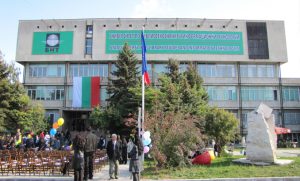УНИВЕРСИТЕТ ПО БИБЛИОТЕКОЗНАНИЕ И ИНФОРМАЦИОННИ ТЕХНОЛОГИИ
Първи стъпки

Университетът по библиотекознание и информационни технологии (УниБИТ) е държавен университет, преобразуван на 29.IХ.2010 г. с решение на Народното събрание. Приемник е на Специализираното висше училище по библиотекознание и информационни технологии, гласувано от Народното събрание през 2004 г., на Държавния библиотекарски институт, създаден през 1950 г., на Полувисшия институт по библиотечно дело (ПИБД), на Колежа по библиотечно дело (КБД) и на Колежа по библиотекознание и информационни технологии (КБИТ). УниБИТ обучава по бакалавърски, магистърски и докторски програми за образователните и научни степени, по които има акредитация.
Материална база
УниБИТ разполага със съвременна материална база за подготовка на своите студенти. Специално проектираната и построена сграда включва тържествена зала; специализирани семинарни кабинети; аудитории; компютърна лаборатория „Джон Атанасов” с модерни компютърни зали с локални мрежи и с постоянен достъп до Интернет, в които се изучават съвременни информационни и комуникационни технологии; Библиотечно-информационен център с читалня за 150 души, чийто специализиран библиотечен фонд е над 52 000 библиотечни единици, и книгохранилище за 80 000 документа; IP Point – информационно-консултантски център по интелектуална собственост; Кариерен център за подпомагане на професионалната реализация на студентите; Учебно-демонстрационна музейна сбирка „Духовност и лидерство”; музейна сбирка на съвременната българска духовност; издателство „За буквите – О писмнехь”; параклис „Св. Николай Чудотворец”; фонетичен кабинет; кабинети за преподавателите и за административния персонал; заседателна зала; модерен физкултурен комплекс със салон; тенис кортове; зала за фитнес; стол; кафе-клуб.Изграждан в продължение на 60 години, УниБИТ удовлетворява много добре потребностите на около 2000 студенти и над 150 щатни и хонорувани преподаватели. Специализираните учебни семинари и кабинети притежават богати учебни фондове, като значителна част от тях са вече библиографска рядкост.
За повече информация: http://www.unibit.bg/



